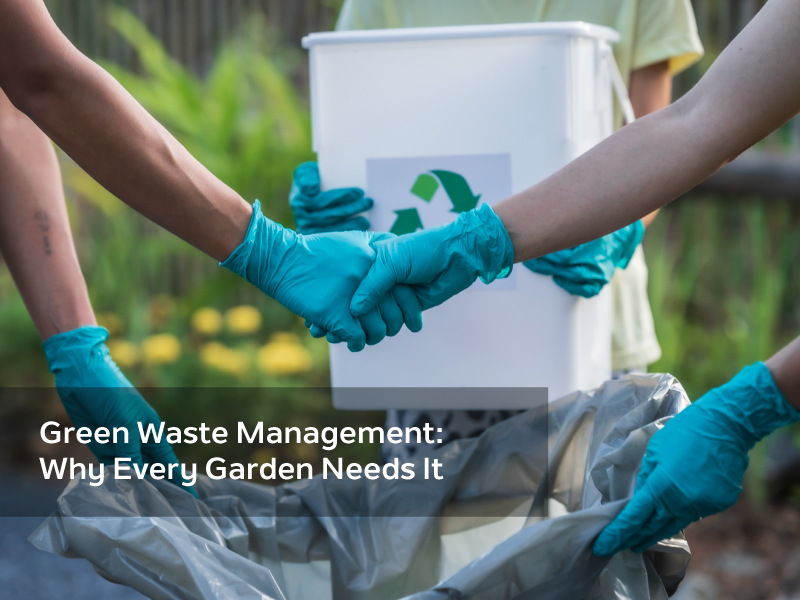Having a nice outside space naturally produces green waste, which includes garden garbage such as grass clippings, leaves, trimmings, and weeds. Still, the way we handle this green waste has major consequences for our gardens, the nearby local environment, and community resources. Green waste management should not simply end at disposal; rather, it should use methods that will convert the trash into a valuable asset. It may be strengthened in soil and lighten landfill weight if treated right; mistreated, it can cause pollution and pest control problems.
A dedicated service such as skip hire Standish provides an easy and environmentally friendly choice for garden clearances on a large scale or site works landscaping. Gathering and properly dumping massive volumes of garden waste lets it be diverted into composting or recycling rather than landfill.
Composting for Improvement of Soil Health
The possibility of generating nutrient-rich compost is the main benefit of green waste management. Composting grass clippings, leaves, and plant trimmings on-site rather than bagging them and disposing of them recycles valuable organic material back into the earth. DIY composting enables the soil to better store nutrients and water by enhancing its structure. Additionally, it introduces beneficial bacteria that control plant disease and reduce reliance on chemical fertilisers. By composting, gardeners complete a natural process, thereby returning garden waste to black gold that promotes better plant growth and reduces external costs.
Curbing Methane Emissions and Landfill Waste
Anaerobic composting (oxygen-free) of green waste in a conventional landfill produces methane, a strong greenhouse gas with a global impact. Warm-up possibilities are many times greater than those of carbon dioxide. The organic waste is kept from going to landfills by home composting, municipal green bins, or skip rental with particular expertise, which separates and processes it from other trash. It may then be composted in a controlled setting, like an industrial composting facility, where it aerobically decomposes and largely reduces poisonous methane creation. And the contribution of your garden to worldwide warming.
Bonus: CRA Developers Properties’ Vision for Sustainable and Smart Urban Communities
Avoid invading Pests and Spreading Diseases
Rat, insect, and snail pest havens are unsorted garden waste piles, that is, decomposing plant material or wood stacks. These piles also serve as shelter for fungus infection and bacteria that may be transmitted back to your otherwise clean garden plants. Appropriate management, for instance, through frequent composting wherein heat or the removal of afflicted plant material in good time, utilising a green waste collection, eliminates disease-causing organisms. The program breaks down these breeding grounds. Maintaining a garden environment healthier depends on this preventative strategy, which is a crucial component of integrated pest management.
Water Conservation and Increasing Water Retention Capacity
Soil treated with green waste compost retains water considerably more than unamended soil.
Particularly helpful in dry times, the composted stuff acts as a sponge absorbing moisture and gradually releasing it to plant roots. Orr for sandy soils that leach water quickly. Good green waste management via composting reduces the frequency and amount of watering required. This saves money and time, in addition to conserving a precious resource for the gardener and makes the garden less vulnerable to drought.
Encouraging Local Recycling and Circular Economies
By recycling green waste through the council green bins or via a professional Hire Standish service that guarantees green waste is recycled, you are helping the local circular economy.
Typically chopped and composted in a specialised plant, the gathered material finds its way to market as mulch or soil amendment to the neighbourhood. This strategy creates local jobs, lowers peat product consumption (whose harvest damages sensitive ecosystems), and provides an eco-friendly substitute for chemical retaining nutrients inside the community. Soil conditioners, Green waste accumulation might make a garden seem untidy and, even worse, present safety hazards.
Bonus: Cabinet approves two corridors of Delhi Metro Phase-IV projects
Managing Seasonal Variations in the Garden
Gardens generate varying quantities of garbage throughout the year; peak volumes are found during autumn (leaf fall) and after intensive pruning or lawn rearrangement in spring and summer. Having a solid green waste strategy in place prepares you for such seasonal surges. Planning ahead of time will let you either establish your compost bin system or reserve a particular green waste skip for a big project. Prevents the garbage from piling up and turning into a massive headache. Ahead planning reduces pain and makes garden upkeep less difficult.
Conclusion
Every responsible gardener has to manage green garbage, way past tidiness to encompass earth care, soil health, and efficiency. Proper recycling of green waste or on-site composting will greatly lower gardeners’ environmental impact, produce nutrient-rich, natural soils, and help to build a healthier garden environment. The benefits cover anything from stimulating local circular economies to pest control and water conservation. At last, the idea of sustainable gardening is the view of garden waste as an asset rather than as rubbish. Adopting a methodical management plan guarantees your garden to be a lovely, productive, and environmentally friendly refuge.

